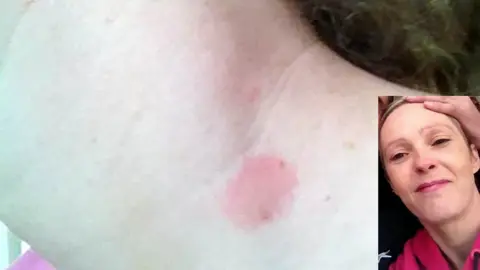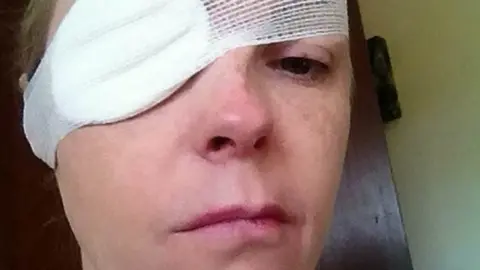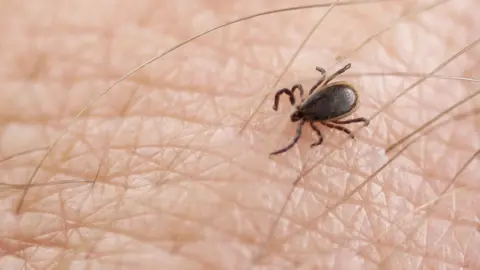Denbighshire mum 'paralysed' after tick bite in garden
 SWNS
SWNSA woman suffered severe facial paralysis - and could only eat through a straw - after being bitten by a tick in her garden.
Rachel Foulkes-Davies, 43, said the bite started off as small red mark before it caused her eyes to swell up.
The mother-of-three said she is still in pain three years on and is angry a correct diagnosis was not made sooner.
Betsi Cadwaladr University Health Board (BCUHB) said it encouraged patients to discuss their concerns with them.
Ms Foulkes-Davies said: "I'm constantly tired and have no energy to do simple tasks."
 SWNS
SWNSThe mother-of-three, of Llanarmon-yn-Iâl, Denbighshire, said the bite happened in June 2015.
Initially she noticed a small red mark on her neck, which later had swollen to the size of 2p coin and turned white.
Then four days later, she started to lose movement in the left side of her face - a sign of facial paralysis.
After attending Deeside NHS hospital, she was diagnosed with Bell's Palsy and given an eye patch before being sent home.
She added: "Over the course of seven to eight months my ability to speak worsened.
"I couldn't talk for two years. I was just living off soups and stews and had to have them through a straw. The same went for hot drinks."
 SWNS
SWNSAfter disputing doctors' initial diagnosis, Ms Foulkes-Davies paid £89 for private tests - which she said diagnosed her with Lyme Disease. Its symptoms include nerve pain, weakened muscles, fatigue and blurred vision.
She added: "If it was diagnosed straight away and treated with Doxycycline I wouldn't have had to go through all this. Doxycycline just wouldn't work now as I'm so far gone."
Almost three years on, Mrs Foulkes-Davies said she suffers from chronic fatigue and has since given up work while struggling to look after her children.
She said: "I was really healthy before the bite.
"I now suffer from blurred vision, brain fog and constant headaches. I have to wear glasses now to watch the TV as the brightness blurs my vision."
 iStock
iStockBCUHB said it could not comment on individual cases "in any detail".
However, a spokesman added: "We would encourage anyone who has a concern about the care they have received to contact us directly to discuss this.
"In Wales, as well as elsewhere in the UK, cases of laboratory-confirmed Lyme disease have increased in recent years.
"This is as a result of better reporting, increased diagnostic testing, and increased awareness by the public and healthcare professionals.
"Anyone who is worried about Lyme Disease or a tick bite can get more information from the NHS Wales website."
